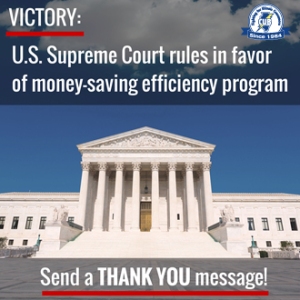
Click image to send FERC a thank you message.
On Monday regulators and consumer advocates won a major victory against big power generators at the U.S. Supreme Court—and that’s good news for anyone who pays a power bill.
In simple terms, the case (FERC v. Electric Power Supply Assocaition) was an argument over whether the Federal Energy Regulatory Commission (FERC) had the jurisdiction to develop, promote and regulate an important efficiency program called “Demand Response.” If we would have lost this battle, it would have killed or at least severely limited the program’s effectiveness in reducing power prices.
You’re not alone if “Demand Response” makes your eyes glaze over. But you should care about Demand Response if…
You pay a power bill. Demand Response (DR) is an umbrella term for any program that pays consumers and big industries to shift their electricity usage away from “peak” times—when electricity usage is at its highest point. DR programs help reduce electricity demand, and that reduces power prices across the market. In fact, the former director of the Illinois Power Agency estimated that removing such a program could jack up ComEd power prices by 20 percent!
Of course, DR eats into energy company profits—and that’s why the Electric Power Supply Association (EPSA), which represents power producers like ComEd-parent Exelon and Dynegy, sued to defeat the program.
You want to keep the lights on. The more you reduce demand during peak times, the less stress on the grid, so DR is great for power grid reliability.
You want to protect the environment. During peak demand times, power plants are working their hardest—including coal plants. So reducing peak demand also means you reduce pollution.
We expect to see Demand Response programs get even better in years to come, as utilities install new digital electric meters across Illinois. And thanks to the Supreme Court ruling, big power generators won’t be able to get in the way.
So, that’s why this court victory–what CUB called a “slam dunk” for consumers–has us smiling, including CUB Policy Director Kristin Munsch. She helped write an Amicus Brief, supporting demand response for the big case. Nice job Kristin, and thank you to FERC for taking this fight all the way to the High Court.
It’s important to encourage federal regulators to fight for lower power bills. Please, sign our thank you note to FERC!

